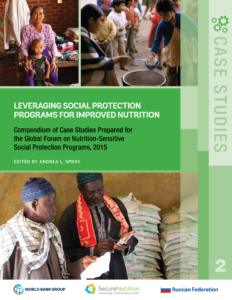Compendium of case studies: Leveraging Social Protection Programs for Improved Nutrition
In 2016, following the 2015 Global Forum on Nutrition-Sensitive Social Protection Programs in Moscow, Russia, the document Leveraging Social Protection Programs for Improved Nutrition: Compendium of Case Studies, was shared on the SecureNutrition website. The compendium serves as a mile marker on progress to improve nutrition outcomes through social protection investments, and a rich database of strategies and approaches in diverse contexts.
[vc_row row_type=”row” text_align=”left” css_animation=””][vc_column][vc_column_text custom_options=””] In 2016, following the 2015 Global Forum on Nutrition-Sensitive Social Protection Programs in Moscow, Russia, the document Leveraging Social Protection Programs for Improved Nutrition: Compendium of Case Studies, was shared on the SecureNutrition website. The compendium serves as a mile marker on progress to improve nutrition outcomes through social protection investments, and a rich database of strategies and approaches in diverse contexts.
In 2016, following the 2015 Global Forum on Nutrition-Sensitive Social Protection Programs in Moscow, Russia, the document Leveraging Social Protection Programs for Improved Nutrition: Compendium of Case Studies, was shared on the SecureNutrition website. The compendium serves as a mile marker on progress to improve nutrition outcomes through social protection investments, and a rich database of strategies and approaches in diverse contexts.
The compendium contains 21 case studies from six international organizations and detail a range of nutrition-sensitive social protection programs being implemented in all regions of the world. It attempts to go beyond high-level mechanics of nutrition-sensitive social protection programs and explore in more detail how these programs are being implemented. The case studies are not offered as “gold standards”, but are representative examples of multisectoral work currently in use. The institutional arrangements, achievements, and other facets encompassed in the compendium are as varied as the programs themselves.
Download the report English
Of the 21 case studies included in the compendium, over half (13) include some form of cash transfer, either conditional (7) or unconditional (6). Most of the case studies are from Africa (8) and Latin America and the Caribbean (5), although all world regions are represented. Analysis of the case studies resulted in identification of 18 cross-cutting themes. The most common were BCC (18), community participation (17), gender and women’s empowerment (17), and multisectoral collaboration (16). Other common themes were integrated approaches (10), lifecycle approaches (8), early child development (8), rural (8), governance (7), resilience (6), agriculture and local procurement (5), and use of mobile technology (5). Less common themes were harnessing nutrition data (4), DBM (3), decentralization (3), performancebased financing (3), urban (3), and conflict-affected settings (2).
Case studies were selected from among those submitted to provide a wide representation of social protection instruments and mechanisms for incorporating nutrition principles. The intent is to provide World Bank Group staff and other technical practitioners involved in the design and implementation of nutrition-sensitive social protection projects information about the types of interventions being carried out, which ones work, the achievements that can be realized, and the challenges involved.[/vc_column_text][vc_separator type=”normal”][vc_row_inner row_type=”row” text_align=”left” css_animation=””][vc_column_inner width=”1/2″][vc_column_text custom_options=””]
Africa
Cabo Verde – National School Food and Nutrition Programme
Ethiopia – Productive Safety Net Program
Kenya – Cash Transfers for Orphans and Vulnerable Children
Mali – Emergency Safety Nets Project (Jigisèmèjiri)
Niger – Niger Safety Net Project
Nigeria – Child Development Grant Program
Republic of Congo – Nutrition-Sensitive Urban Safety Net Program
Tanzania – Tanzania Productive Social Safety Net
East Asia & Pacific
Indonesia – PNPM Generasi Program
Indonesia – Program Keluarga Harapan Prestasi
Myanmar – Tat Lan Program: Maternal and Child Cash Transfer (MCCT) Pilot
Philippines – Philippines Social Welfare Development and Reform Project[/vc_column_text][/vc_column_inner][vc_column_inner width=”1/2″][vc_column_text custom_options=””]
Europe & Central Asia
Kyrgyz Republic – Optimizing Primary School Meals Programme
Latin America & the Caribbean
Brazil – National School Feeding Programme
Dominican Republic – Progresando Con Solidaridad
Haiti – Kore Lavi
Mexico – Mexico Program of Social Inclusion PROSPERA
Peru – Juntos Results for Nutrition SWAp
Middle East & North Africa
Djibouti – Social Safety Net Project
Syrian Arab Republic – Fresh Food Vouchers for Pregnant & Lactating Internally Displaced Women
South Asia
Bangladesh – Income Support Program for the Poorest[/vc_column_text][/vc_column_inner][/vc_row_inner][vc_separator type=”normal”][vc_column_text custom_options=””]This report was produced by SecureNutrition with funding from the Russian Federation. The goal of SecureNutrition is to support the efforts of World Bank Group (WBG) staff to catalyze and foster nutrition-sensitive investments and activities across the key conditions that lead to poor nutrition. It is one of a suite of knowledge products—including an evidence review, a forum report, and a seminar series—that all result from the Global Forum on Nutrition-Sensitive Social Protection Programs in Moscow in September 2015.
Throughout 2017, in collaboration with SecureNutrition, the SUN Movement website will feature summaries of the cases studies via In Practice articles to help build the dialogue on nutrition-sensitive social protection programs.[/vc_column_text][/vc_column][/vc_row]